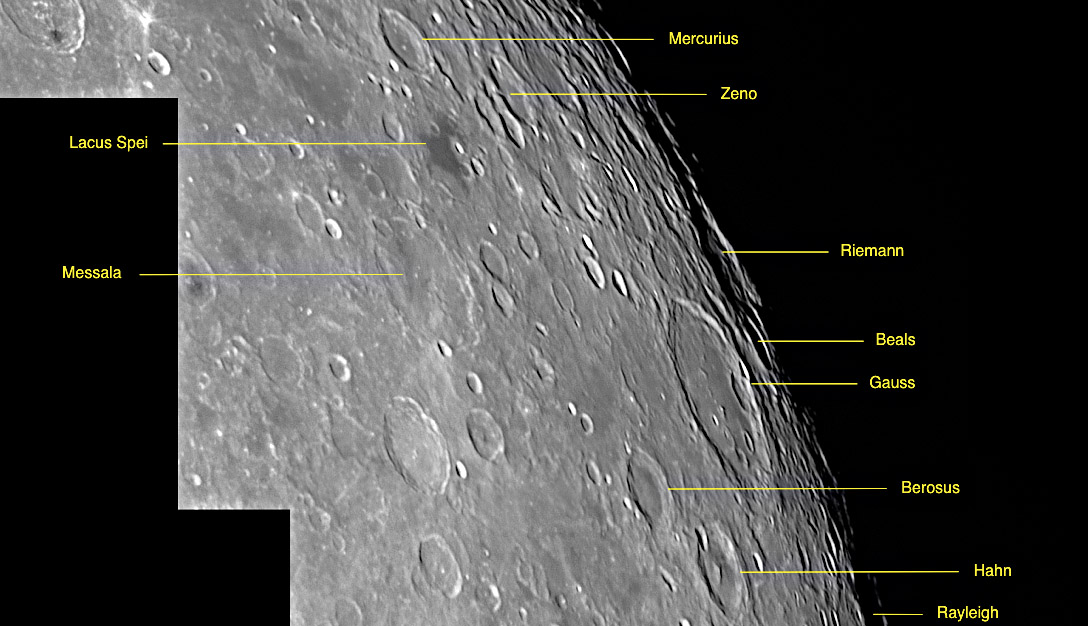Difference between revisions of "May 5, 2010"
| (One intermediate revision by the same user not shown) | |||
| Line 6: | Line 6: | ||
<em>image by [mailto:jocelyn.serot@wanadoo.fr Jocelyn Sérot], France</em><br /> | <em>image by [mailto:jocelyn.serot@wanadoo.fr Jocelyn Sérot], France</em><br /> | ||
<br /> | <br /> | ||
| − | Is this a corner of the Moon you overlook? Have you specifically observed any of these craters? I thought not. The north eastern limb is an area lacking in remarkable craters, has only the smallest patch of mare lava, and generally looks tired. There are no detected basins right here to provide interesting rilles and wrinkle ridges. Its not as highly cratered as the farside so at some point the really old craters were erased. About the only way to erase things is a large impact, so perhaps Spei does mark the location of an ancient [http://lpod. | + | Is this a corner of the Moon you overlook? Have you specifically observed any of these craters? I thought not. The north eastern limb is an area lacking in remarkable craters, has only the smallest patch of mare lava, and generally looks tired. There are no detected basins right here to provide interesting rilles and wrinkle ridges. Its not as highly cratered as the farside so at some point the really old craters were erased. About the only way to erase things is a large impact, so perhaps Spei does mark the location of an ancient [http://www2.lpod.org/wiki/April_5,_2010 |basin], gone except for crustal weaknesses that later allowed a little magma to reach the surface. This area was apparently much more interesting 3-4 billion years ago. We came too late for the best view.<br /> |
<br /> | <br /> | ||
<em>[mailto:tychocrater@yahoo.com Chuck Wood]</em><br /> | <em>[mailto:tychocrater@yahoo.com Chuck Wood]</em><br /> | ||
| Line 14: | Line 14: | ||
<br /> | <br /> | ||
<strong>Related Links</strong><br /> | <strong>Related Links</strong><br /> | ||
| − | Rükl plate [https://the-moon.us/wiki/R%C3% | + | Rükl plate [https://the-moon.us/wiki/R%C3%BCkl_16 16]<br /> |
Jocelyn's updated lunar [http://pagesperso-orange.fr/legalet/AstroLG/Lune.html website]<br /> | Jocelyn's updated lunar [http://pagesperso-orange.fr/legalet/AstroLG/Lune.html website]<br /> | ||
<br /> | <br /> | ||
Latest revision as of 08:33, 28 October 2018
Hidden Ancient History

image by Jocelyn Sérot, France
Is this a corner of the Moon you overlook? Have you specifically observed any of these craters? I thought not. The north eastern limb is an area lacking in remarkable craters, has only the smallest patch of mare lava, and generally looks tired. There are no detected basins right here to provide interesting rilles and wrinkle ridges. Its not as highly cratered as the farside so at some point the really old craters were erased. About the only way to erase things is a large impact, so perhaps Spei does mark the location of an ancient |basin, gone except for crustal weaknesses that later allowed a little magma to reach the surface. This area was apparently much more interesting 3-4 billion years ago. We came too late for the best view.
Chuck Wood
Technical Details
Apr 29, 2010 around 0:15 UT. Mewlon 210 at prime focus, Astronomik red filter, DMK 31AF03, 9 images assembled, 250/1000 images stacked for each. Processing Avistack + Registax.
Related Links
Rükl plate 16
Jocelyn's updated lunar website
Yesterday's LPOD: Not Much Red
Tomorrow's LPOD: Flows of a Different Kind
COMMENTS?
Register, Log in, and join in the comments.



